Creating a practical list of employee engagement survey questions is all about choosing the right questions that’ll help you measure your employees’ motivation, commitment, and a sense of purpose in the company. Should you include more open-ended questions than you did last year? Should you ask employee satisfaction survey questions or employee feedback questions? Should you compile the list yourself or leave things to your HR team?
And even after so much planning and so many concerns, many companies aren’t satisfied with their employee engagement survey results. This is mainly due to not choosing the right employee engagement questions for their surveys in the first place.
If this story sounds familiar or if this is your first time doing this, read on. Below, we share the best employee engagement survey questions, and it’s up to you to pick the ones that resonate with you and your work environment.
What are Employee Engagement Surveys and Why Do I Need Them?
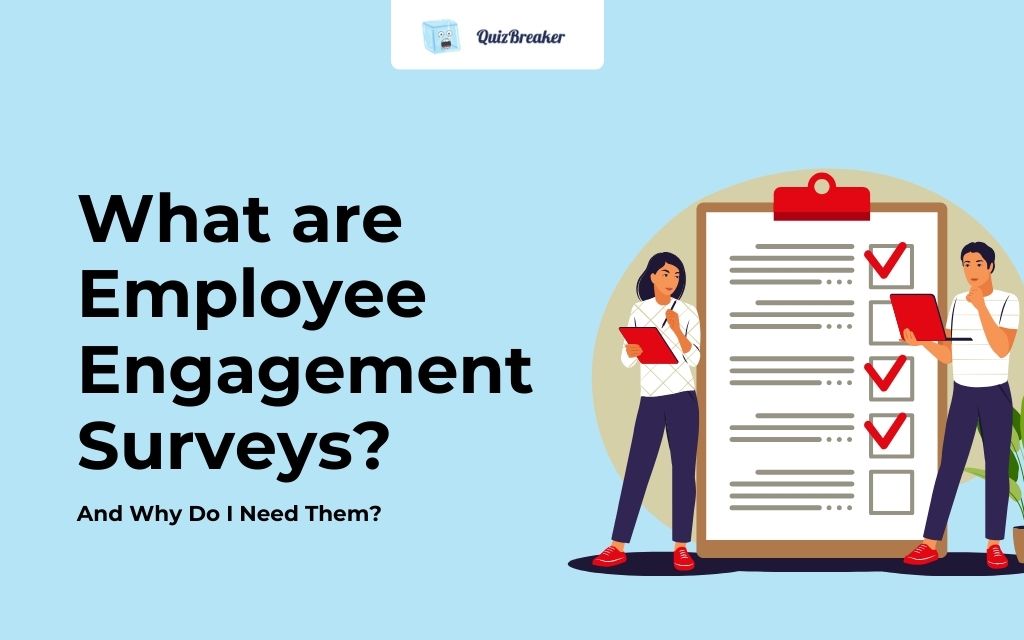
Employee Engagement Surveys are tools used by teams to measure and understand how engaged employees are with their work and the company. These surveys typically include questions that assess various aspects of employee engagement. Some of those areas include job satisfaction, commitment to the organization, relationships with colleagues and managers, and perceptions of the work environment.
Running these types of surveys can help you gauge how engaged your employees are. Understanding the current level of engagement can highlight areas where your organization is doing well and where you need to make improvements.
These surveys can also provide insights into how employees feel about their roles, their colleagues, management, and the company as a whole. This information will help you identify any issues (if any) that could be affecting morale and productivity.
Key Components of an Effective Employee Engagement Survey
- Clear and Relevant Questions. Use questions that are easy to understand and relevant to the employees' experiences.
- Anonymity. Guaranteeing anonymity can lead to more honest and candid responses.
- Actionable Insights. Design the survey to gather data that can be translated into actionable insights.
- Frequency. Conduct surveys regularly to track changes and improvements over time.
- Follow-up. Communicate the results to employees and outline the steps the organization will take in response to the feedback.
Regularly conducting employee engagement surveys can create a more engaged, motivated, and productive workforce, leading to better overall organizational performance.
Why Does Employee Engagement Matter?
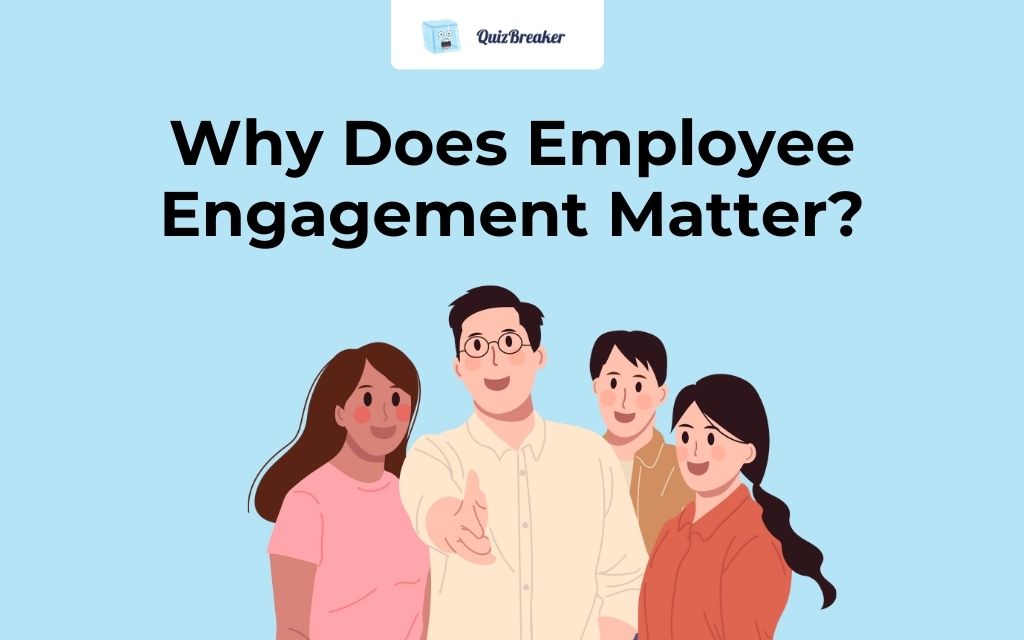
There are many reasons why employee engagement matters, and in this section, we’ll cover the most significant ones.
1) Employee satisfaction
First of all, high employee engagement means high employee satisfaction. This results in employees who are committed, satisfied, and devoted to their purpose along with the company’s mission.
Pulse surveys are a great way of helping learn more about your employee satisfaction levels and finding ways to meet employee sentiment and pain points.
2) Lower absenteeism
Higher engagement levels also equal lower absenteeism. If absenteeism is high, it can prevent the company from reaching its potential and fulfilling its goals. For example, workers won’t be able to meet all deadlines, and projects may remain unfinished. On the other hand, engaged employees tend to show up at work and inform their superiors about their potential absence well in advance (of course, there are always exceptions, like waking up with a fever).
3) Employee retention
Next, employee engagement is closely linked to employee retention. If your workers are showing enthusiasm, take the initiative, perform well in projects as well as on their own - it’s safe to assume they enjoy being in the office. Put simply, the percentage of engaged employees who decide to walk out of an organization is significantly lower than that of disengaged workers.
4) Employee productivity and performance
We need to mention employee productivity and performance, too. Engaged employees tend to be much more efficient, live up to their manager's expectations, and produce higher-quality work than the rest of their peers. In general, engaged workers are aligned with their teams and understand both their company’s goals and their own, which results in better performance at work.
5) Employee motivation
This goes hand in hand with employee motivation. Engaged employees are motivated employees. Workers with high motivation levels don’t procrastinate, don’t miss project deadlines, don’t forget to send important emails (or reply to them), and seem to have excellent organizational skills to do all their work in the timeframe they’ve been given. They also have a high sense of accomplishment, and every success seems to motivate them to be even better.
6) Work environment
Finally, employee engagement affects the whole work environment. When workers act in a disengaged manner, there’s a sense of chaos in the air, which may affect the rest of the employees negatively. On the other hand, when workers show commitment and engagement, they can inspire the other workers to follow suit.
How do surveys help with employee engagement?
A survey with thought-provoking questions allows employees to contemplate their job responsibilities, think about how motivated (or perhaps demotivated) they’ve been feeling lately and the reasons behind it, and inspect their overall engagement levels in a way that feels right for them.
This evaluation of their work, engagement levels, and overall motivation can shed light upon areas that haven’t been blossoming lately. This, in turn, can make your employees willing to be more engaged and improve those particular areas.
Now, let’s consider your perspective as an employer. How can surveys help you improve the employee engagement levels in your company? How can they provide a better employee experience so that workers can do their best work?
Well, this one’s easy - employee engagement surveys paint a very clear picture of where your company’s at and where it’s heading and provide you with actionable steps. In other words, when you conduct surveys correctly, you get to see what changes you need to make next in your organization so that everyone’s more aligned with the company’s mission. This is a step-by-step process, though. Don’t expect to see any dramatic changes overnight - such transformations may take some time, but once you know what you need to do, it’s much easier than being in the dark.
Now that you know why these types of surveys matter, let’s move on to the questions.
Employee Engagement Survey Questions
Whenever you’re creating an employee engagement survey, it’s important to include versatile survey questions. That way you can make sure you’ve tackled all areas that need to be measured and assessed. Plus, you get insights into many business-related matters along with your workers’ attitudes toward them.
This is the reason why we’ve included 10 categories with 10 questions each - there’s something for every employer or HR leader out there, including you.
1) Job Happiness and Fulfillment Questions
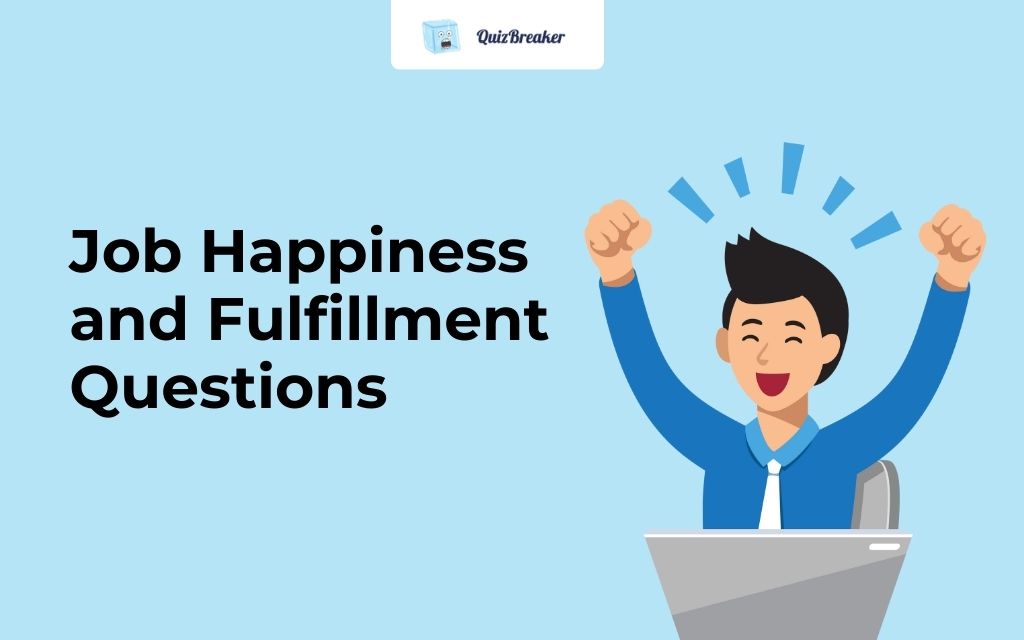
“Find a job you enjoy doing, and you will never have to work a day in your life.”
Many believe employee happiness is a more temporary state, whereas fulfillment tends to go much deeper. Both are needed for employee satisfaction, more engaged employees, and achieving planned company goals.
However, how can employers know whether their employees are happy and fulfilled? By asking the right questions, of course.
That’s why below we share sample questions regarding matters such as employee happiness and a sense of fulfillment (or lack of it) workers may be dealing with in their work environment.
-
On a scale of 1-10 (1 being the lowest, and 10 the highest), how fulfilling would you say your job is?
-
What’s the best thing about your work?
-
How do your work responsibilities affect your overall mood and happiness?
-
How likely are you to recommend the organization/company you work for to a friend/family member? (1) Not likely; (2) Somewhat likely; (3) Very likely;
-
Do you think a higher salary at the same job position would bring you more happiness?
-
What helps you get through the day when you’re dealing with a lot of work-related issues?
-
I’m quite happy with the relationship I have with my peers. (1) Strongly disagree; (2) Disagree; (3) Neither agree nor disagree; (4) Agree; (5) Strongly agree;
-
What three words would you use to describe your feelings when you’re at work?
-
I can deal with challenging clients without it affecting my mood. (1) Strongly disagree; (2) Disagree; (3) Neither agree nor disagree; (4) Agree; (5) Strongly agree;
-
When you’re feeling down at work, are you trying to hide your feelings from the senior leaders/managers/team members?
2) Communication Questions
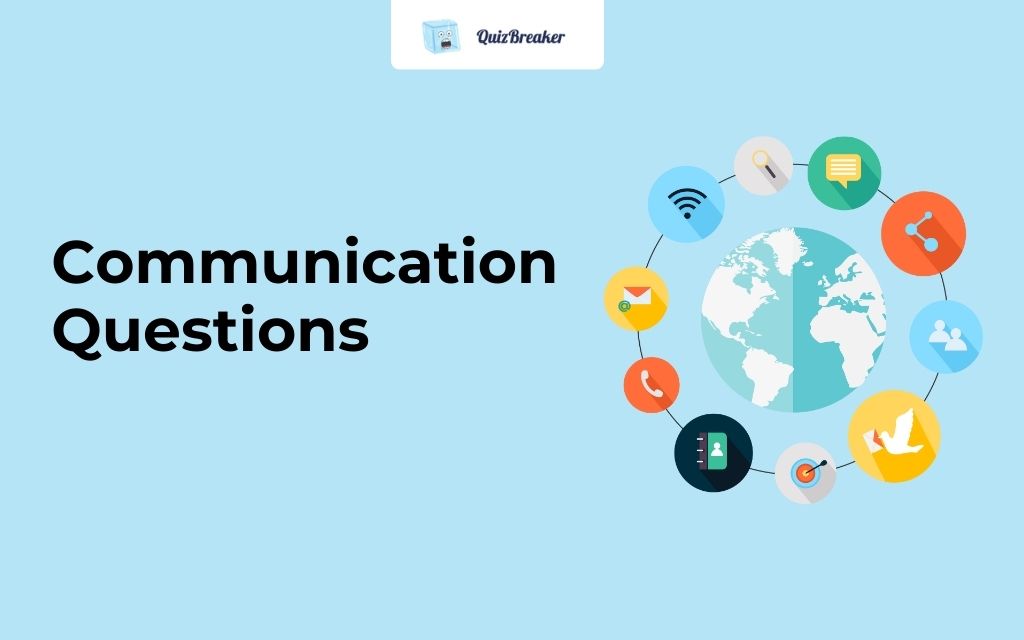
"No matter what job you have in life, your success will be determined 5% by your academic credentials, 15% by your professional experiences and 80% by your communication skills."
Communication has always played an important role in the workplace, especially now that we’re dealing with many types of communication. Employees are required to engage both in online communication and physical communication; then there’s written communication and spoken communication.
Workers are also expected to send and answer emails and messages, call, be active on social media groups related to their work, communicate on apps such as Slack (or whatever tool your company may be using), and so on. Communication may also include videos, images, audio messages, and so on.
All these different types of communication shape how we receive, interpret, announce, and process a large amount of information and news in our day-to-day work. And this applies to almost every workplace out there in some way or another.
However, high achieving employers aren’t just interested in observing the communication levels in their company. They’re interested in how, when, and where that communication takes place. And more importantly, they’re eager to learn whether the communication is effective or not.
And asking employee engagement survey questions such as the ones that follow is the way to get the answers you need.
-
My company provides detailed employee feedback so that people can understand whether they’re doing their jobs well. (1) Strongly disagree; (2) Disagree; (3) Neither agree nor disagree; (4) Agree; (5) Strongly agree;
-
If there are any problematic employee survey results, the senior leaders at our company make sure to discuss such matters with workers. (1) Strongly disagree; (2) Disagree; (3) Neither agree nor disagree; (4) Agree; (5) Strongly agree;
-
If something unexpected happens during your work, do you know who to get in touch with?
-
Does your company listen to your worries and concerns (and those of your peers)?
-
Which channels do you usually rely on for important company announcements?
-
When the company conducts employee engagement surveys such as this one, are you informed about them ahead of time?
-
What can the company you work for do to improve its communication strategies?
-
On a scale of 1-10 (1 being the lowest, and 10 the highest), how would you rate the onboarding process you received back when you were a new hire?
-
How transparent are your managers with you and your team members?
-
Do you think the company takes the employee feedback it receives from employee satisfaction survey questions seriously?
3) Management and Leadership Questions

“If you hire people just because they can do a job, they’ll work for your money. But if you hire people who believe what you believe, they’ll work for you with blood and sweat and tears.”
Effective management and leadership are essential for your employees’ motivation and engagement, teamwork, a sense of purpose and direction, and so on. Therefore, getting insights into how your employees feel about these people in your company is crucial.
And now, onto the questions themselves.
-
On a scale of 1-10 (1 being the lowest, and 10 the highest), how satisfied are you with the way your company manages employees?
-
Before you start working on a task, is the appropriate amount of information communicated to you so that you can make an informed decision?
-
Do you believe the company communicates with all workers in the same manner?
-
I have a very clear understanding of my company’s informal processes and structures. (1) Strongly disagree; (2) Disagree; (3) Neither agree nor disagree; (4) Agree; (5) Strongly agree;
-
Senior leaders care about my opinions. (1) Strongly disagree; (2) Disagree; (3) Neither agree nor disagree; (4) Agree; (5) Strongly agree;
-
If there are any disengaged employees in the office, the management would take action to handle the situation. (1) Strongly disagree; (2) Disagree; (3) Neither agree nor disagree; (4) Agree; (5) Strongly agree;
-
How would you describe your company’s leadership style?
-
The senior leaders in my company have integrity and authority. (1) Strongly disagree; (2) Disagree; (3) Neither agree nor disagree; (4) Agree; (5) Strongly agree;
-
What methods do the senior leaders at your company use to gain commitment from team members?
-
Do you agree with the following statement - engaged managers mean engaged employees?
4) Work Environment Questions
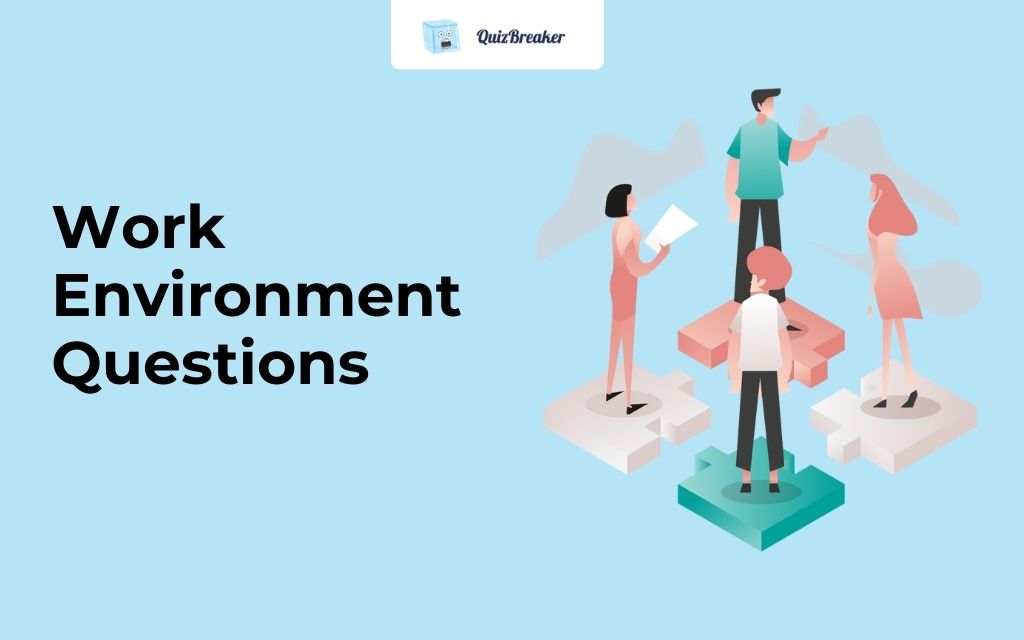
“How do you change the world? Bring people together. Where is the easiest big place to bring people together? In the work environment.”
Work environment refers to all the physical and situational factors which form the overall corporate atmosphere.
Whatever the work environment may be, it’s important for employees to work in safe and professional conditions. Put simply; a positive work environment can boost your motivation, whereas a negative one may demotivate you.
Learning more about how your employees perceive their work environment and how they feel about it can help you see what needs improvements and what should stay the same.
So if you wonder how your employees feel about the new colors in the office, the change in equipment, the new arrangement in the office, or the additional indoor plants at the end of the hall, it’s time to include some work environment survey questions in your next employee engagement survey.
-
Although my office is a great place to be in, I feel like I need a change in scenery. (1) Strongly disagree; (2) Disagree; (3) Neither agree nor disagree; (4) Agree; (5) Strongly agree;
-
Whenever I need to relax, I go outside and enjoy the nice area in front of my company’s building. (1) Strongly disagree; (2) Disagree; (3) Neither agree nor disagree; (4) Agree; (5) Strongly agree;
-
On a scale of 1-10 (1 being the lowest and 10 the highest), how friendly would you say your work environment is?
-
My office has all the necessary equipment, tools, and materials I need to do my job well. (1) Strongly disagree; (2) Disagree; (3) Neither agree nor disagree; (4) Agree; (5) Strongly agree;
-
How likely are you to get bored with your current workspace? (1) Not likely; (2) Somewhat likely; (3) Very likely;
-
On the whole, how would you describe the workplace atmosphere?
-
What areas need some improvement?
-
What’s the one thing that stands out for you in this work environment?
-
I feel safe doing my job in this work environment. (1) Strongly disagree; (2) Disagree; (3) Neither agree nor disagree; (4) Agree; (5) Strongly agree;
-
Have you ever been exposed to any hazards at work? If yes, please specify.
5) Workplace Engagement Questions
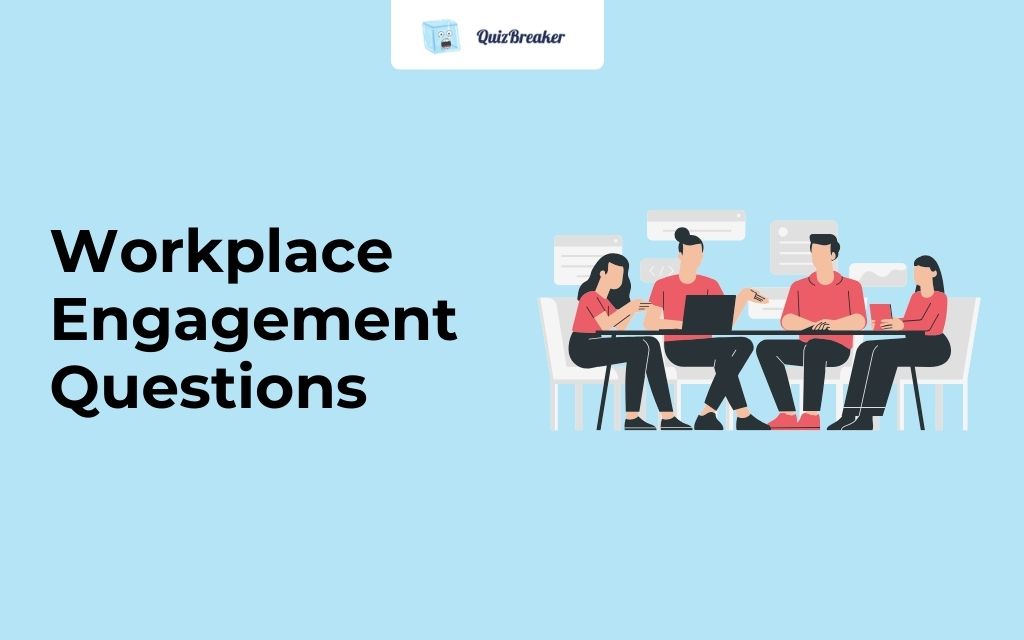
“People who end up with the good jobs are the proactive ones who are solutions to problems, not problems themselves, who seize the initiative to do whatever is necessary, consistent with correct principles, to get the job done.”
-
How do your employees feel about their workplace?
-
Do they get along with their peers?
-
How can you tell if you’re dealing with engaged employees or disengaged ones?
-
Can a worker start losing interest in their workplace, therefore, reducing their performance levels?
Honestly, when you’re an employee running a company - everything’s possible.
And while it’s not up to you to take the blame each time something goes wrong or employees start being less engaged than they used to, it’s your responsibility to identify such changes in employee engagement levels and address them adequately.
We hope the survey questions below can help.
-
My current workload seems manageable. (1) Strongly disagree; (2) Disagree; (3) Neither agree nor disagree; (4) Agree; (5) Strongly agree;
-
If you left your job tomorrow, what would your reason be?
-
If you are offered the same job position at another organization, how likely is it that you will stay with the same company? (1) Not likely; (2) Somewhat likely; (3) Very likely;
-
On a scale of 1-10 (1 being the lowest, and 10 the highest), how satisfied are you working for this company?
-
Would you say the company you work for provides a high-quality employee experience?
-
Most of the time, I feel a sense of accomplishment from what I do. (1) Strongly disagree; (2) Disagree; (3) Neither agree nor disagree; (4) Agree; (5) Strongly agree;
-
The work I do has a positive impact on the people in this industry. (1) Strongly disagree; (2) Disagree; (3) Neither agree nor disagree; (4) Agree; (5) Strongly agree;
-
I feel engaged both when I work with people and do tasks on my own. (1) Strongly disagree; (2) Disagree; (3) Neither agree nor disagree; (4) Agree; (5) Strongly agree;
-
Do your team members inspire you to perform better?
-
On a scale of 1-10 (1 being the lowest, and 10 the highest), how would you rate your current employee engagement levels?
6) Benefits and Compensation Questions

“It’s unfair to see managers buying brand new cars for themselves when the salaries of their workers still remain unpaid! Good leaders are not selfish thinkers!”
Benefits, compensation, salary, and financial rewards are very sensitive topics. However, that doesn’t mean they should be excluded from the employee engagement survey questions, on the contrary! You need insights into such matters so that you know how to proceed with certain financial decisions, and what better way than to ask your employees directly (and anonymously, of course? Here are some statements and questions that might be helpful.
-
I believe the process for determining my salary in the company is fair and impartial. (1) Strongly disagree; (2) Disagree; (3) Neither agree nor disagree; (4) Agree; (5) Strongly agree;
-
What rewards and recognition matter most to you?
-
Financial rewards are much more valuable than public recognition. (1) Strongly disagree; (2) Disagree; (3) Neither agree nor disagree; (4) Agree; (5) Strongly agree;
-
When you think about the future in this work environment, what are your salary expectations?
-
I’m always rewarded for my extra contributions to the company. (1) Strongly disagree; (2) Disagree; (3) Neither agree nor disagree; (4) Agree; (5) Strongly agree;
-
On a scale of 1-10 (1 being the lowest, and 10 the highest), how satisfied are you with the pension plan in your company?
-
Have you ever negotiated a compensation package?
-
On a scale of 1-10 (1 being the lowest, and 10 the highest), how satisfied are you with your current salary?
-
How much do end-of-the-year bonuses contribute to the employee engagement levels in this work environment?
-
How likely are you to get promoted in the upcoming period? (1) Not likely; (2) Somewhat likely; (3) Very likely;
7) Personal Growth Questions

"What you do makes a difference, and you have to decide what kind of difference you want to make."
Personal growth affects our corporate lives much more than we may initially realize. Fortunately, though, many HR teams and employers understand this, so they see how this notion is connected to concepts such as employee feedback, job satisfaction, the company’s mission, and so on.
In other words, they see how something seemingly “personal” gets to play such an important role in corporate settings and one’s work environment.
Because here's the thing: people absolutely get to upgrade their personal skills and qualities while doing their work. And the work environment can be a place where they get to work on their personal growth as well.
Namely, according to Psychologist Anywere Anytime, personal growth and development involves “[the growth and enhancement of all aspects of the person, the feelings the person has about himself or herself, and their effectiveness in living. It includes the development of positive life skills and the development of a realistic and healthy self-esteem. .”
If this sounds a bit confusing and you aren’t sure how it can be used in your survey questions, take a look at the following examples.
-
I believe most employee survey questions should revolve around a worker’s personal growth. (1) Strongly disagree; (2) Disagree; (3) Neither agree nor disagree; (4) Agree; (5) Strongly agree;
-
At work, my opinions and contributions seem to be welcomed. (1) Strongly disagree; (2) Disagree; (3) Neither agree nor disagree; (4) Agree; (5) Strongly agree;
-
On a scale of 1-10 (1 being the lowest, and 10 the highest), how much freedom would you say you have in deciding how to do your work?
-
How satisfied are you with the amount of flexibility you have in your work schedule?
-
How does remote work impact your working habits?
-
Do your company’s mission and overall purpose inspire you?
-
Which new responsibilities (if any) are you willing to take on in the upcoming period?
-
On a scale of 1-10 (1 being the lowest, and 10 the highest), how important would you say making mistakes is for an employee’s personal growth?
-
Has your current job position helped you discover some hidden talents? If yes, which ones?
-
My job is helping me become the person I always wanted to be. (1) Strongly disagree; (2) Disagree; (3) Neither agree nor disagree; (4) Agree; (5) Strongly agree;
8) Work-Life Balance Questions
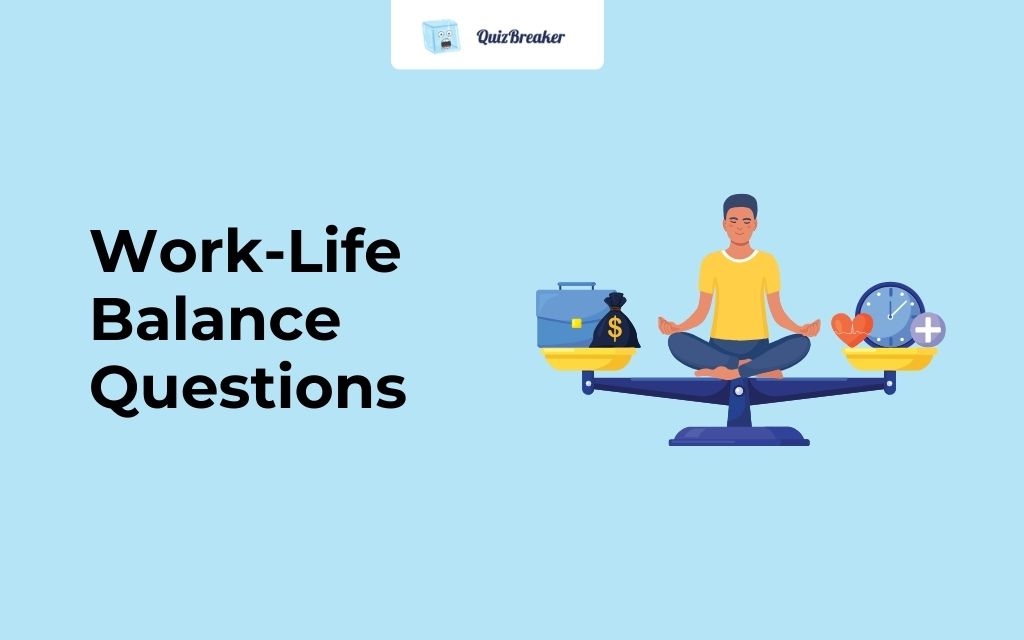
“Every job will demand some sacrifice. The key is to avoid unnecessary sacrifice.”
Work-life balance is the notion where an employee manages to equally prioritize their corporate tasks and their personal life. And while this sounds fairly easy, many workers struggle to implement this in their day-to-day lives.
This may be due to increased work responsibilities, more home chores, having a child, going through a health crisis, and so on. In essence, balancing one’s personal and professional life is tough, but it’s essential.
It’s not until a worker has managed to more or less balance these two aspects that they can get to enjoy high-quality life.
-
So, are your workers prioritizing their health?
-
Do they use their vacation days?
-
Do they ask for some time off if they’re going through some personal struggle?
-
Have they asked for a more flexible working time?
-
Have you ever felt an employee might be going through a burnout episode?
Maybe they’re waiting for you to ask and take the necessary action. And it could be that the next employee engagement survey informs you about many of these work-life balance matters.
-
How can you improve your work-life balance?
-
I can manage both my personal and company goals successfully. (1) Strongly disagree; (2) Disagree; (3) Neither agree nor disagree; (4) Agree; (5) Strongly agree;
-
How likely are you to accept working overtime? (1) Not likely; (2) Somewhat likely; (3) Very likely;
-
Do you take work home? If yes, how often?
-
Job satisfaction is as important as an employee’s personal life satisfaction. (1) Strongly disagree; (2) Disagree; (3) Neither agree nor disagree; (4) Agree; (5) Strongly agree;
-
I prioritize my job over my family life. (1) Strongly disagree; (2) Disagree; (3) Neither agree nor disagree; (4) Agree; (5) Strongly agree;
-
I never check emails after work. (1) Strongly disagree; (2) Disagree; (3) Neither agree nor disagree; (4) Agree; (5) Strongly agree;
-
Have you ever suffered from burnout?
-
Do you have enough free time to pursue hobbies and other personal interests?
-
Have you ever worked during a vacation?
9) Work Culture Questions
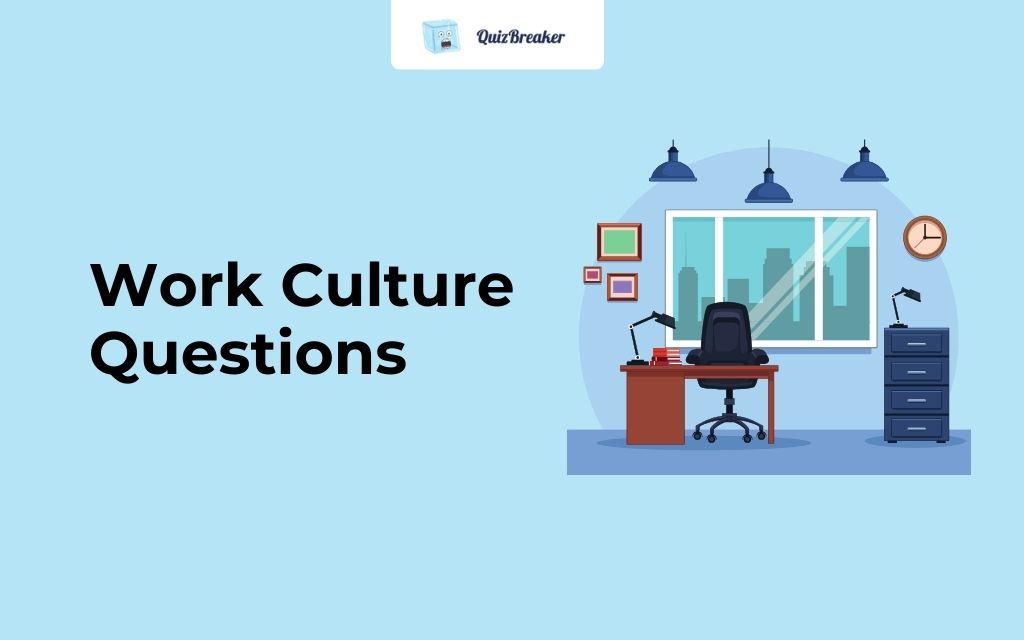
“We believe that it’s really important to come up with core values that you can commit to. And by commit, we mean that you’re willing to hire and fire based on them. If you’re willing to do that, then you’re well on your way to building a company culture that is in line with the brand you want to build.”
Work culture can be defined as a collection of behaviors, beliefs, and attitudes that exist within any corporate context.
But here’s the thing: work culture can be positive, uplifting, and motivating, or dysfunctional, toxic, and depressing. Healthy work culture enables employees to understand company policies, follow the planned goals, and maintain their well-being. On the other hand, toxic work culture creates chaos, causes frustration, and negatively affects the whole business.
So, does your company encourage qualities such as accountability, freedom of expression, equity, recognition, and so on? Or is it the opposite?
Of course, you need to ask your employees and see what they have to say about it, so take our survey questions as a starting point to do so.
-
What four words would you use to describe the company culture in the organization you work for?
-
How does your company celebrate milestones?
-
On a scale of 1-10 (1 being the lowest, and 10 the highest), how engaging are the leisure activities the company offers?
-
My company’s wellness program is one of the best out there. (1) Strongly disagree; (2) Disagree; (3) Neither agree nor disagree; (4) Agree; (5) Strongly agree;
-
Do you understand the company’s mission and values?
-
The company encourages risk-taking. (1) Strongly disagree; (2) Disagree; (3) Neither agree nor disagree; (4) Agree; (5) Strongly agree;
-
What can the company do to improve its work culture?
-
The company celebrates the successes of individuals. (1) Strongly disagree; (2) Disagree; (3) Neither agree nor disagree; (4) Agree; (5) Strongly agree;
-
Would you say there’s some type of discrimination in the company? If yes, please be specific.
-
Is there a good opportunity for teamwork and open cooperation within the company’s culture?
10) Professional Growth Questions

“Your personal and professional lives will have to go hand in hand and will have influence on each other.”
Our final section deals with professional growth questions that are closely linked to the personal growth questions, hence our quote.
In essence, personal development and growth are the foundation for everything else that follows. If you focus on your personal growth first, you’re able to progress much faster professionally, too.
On the whole - personal and professional growth complement one another.
With that said, in our article, we placed them in two separate sections, and that is not to say one is more important than the other. As we already explained - they go hand in hand.
The professional growth section includes employee engagement survey questions that deal with employees’ corporate development, learning opportunities, overall career accomplishments, and so on.
Here they are:
-
I feel that I’m growing professionally in this company. (1) Strongly disagree; (2) Disagree; (3) Neither agree nor disagree; (4) Agree; (5) Strongly agree;
-
On a scale of 1-10 (1 being the lowest, and 10 the highest), how much would you say your current position allows you to learn and develop new skills?
-
I clearly see how I can advance my career in this organization. (1) Strongly disagree; (2) Disagree; (3) Neither agree nor disagree; (4) Agree; (5) Strongly agree;
-
Can you name three of your most recent successes?
-
How likely are you to make a bigger difference in this company in the upcoming years? (1) Not likely; (2) Somewhat likely; (3) Very likely;
-
What are you most proud of when it comes to your career accomplishments?
-
Do you think that the company should provide its employees with more learning opportunities?
-
What are your current short-term and long-term company goals?
-
On a scale of 1-10 (1 being the lowest, and 10 the highest), how much would you say your team members believe this work environment provides healthy competition?
-
Do you believe all engaged employees focus on finding additional development-focused activities?
And with this, we conclude our list of employee engagement survey questions. If there are some questions left unanswered, check out the following section.
How to Conduct an Employee Engagement Survey (Step-by-Step)
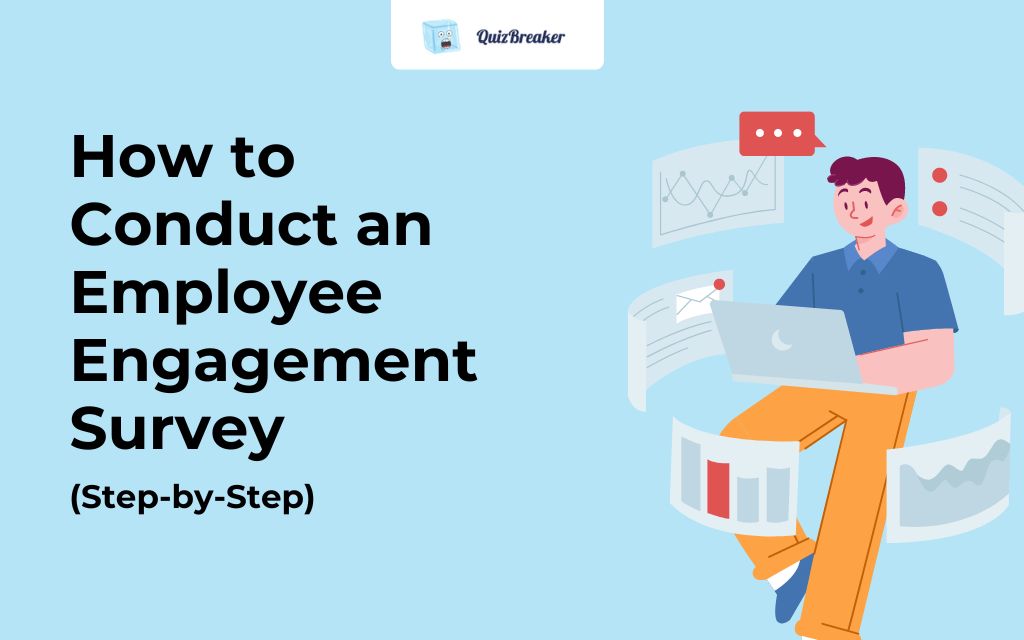
Conducting an employee engagement survey isn’t the most daunting task you (and/or your HR team) will have to plan. Still, it does require some planning, especially when it comes to picking the questions and making sure all relevant employees take part in it.
Here are the main steps we’ve identified as part of the process of conducting an employee engagement survey.
1) Outline the main purpose of the survey
Yes, you are conducting an employee engagement survey, and that’s the main thing, but what exactly are you trying to find out? Is it the general engagement levels in the company?
Is it the ways in which your workers can become more engaged? Perhaps discovering the reasons that made certain workers feel disengaged? Thinking about what it is you want to get out of the survey is key to obtaining the best results.
2) Prepare your employee engagement survey questions
We already covered this bit by answering the first question, so we just want to add that crafting your survey questions carefully can help you target specific issues and get relevant insights. We also encourage you to include both open and closed questions in order to make the survey as versatile as possible and cater to different employee needs.
3) Choose a digital platform
Let’s face it - there’s no easier option to carry out a survey than opting for a digital platform. Long gone are the days when HR teams had to print out surveys and distribute them to the employees. Of course, if this is something that resonates with you and your company - by all means, go for it, it’s just that nowadays, there are much more effective ways to conduct any type of survey.
Deciding to use an online platform and sticking with it for a while is great because it’s convenient to use, it’s time-efficient, and you’ll have instantly available data, ready to be analyzed.
4) Inform your employees about the survey
Make sure all workers are informed about the upcoming engagement survey. You can inform them via email, employee meetings (both online and in-person), video messages, and so on.
Whatever method you go for, make sure everyone’s informed. That said, it’s not just about letting your workers know there’s going to be an employee engagement survey. It’s about telling them other details, too, like ensuring they understand the survey is anonymous, informing them how much time it’s going to take, and so on.
5) Tell them about the power employee surveys have
Informing your workers about an upcoming survey is great, but until they understand why participating in the survey is important, they may not bother to take it.
In essence, you need to make sure they’re aware of why employee engagement surveys are significant and what kind of impact their feedback can have. For instance, if certain employees have been having issues with the way compensation and benefits are handled in the company, you may let them know that you wish to hear their opinion and that getting arguments and feedback can help change things in the office.
6) Schedule the survey
This one is pretty much self-explanatory. Make sure you allow workers to set aside enough time to take the survey, which is why we encourage thorough preparation and informing your employees about the survey well in advance.
You don’t want to leave things to chance. There may also be employees on leave or any other scenario which may have prevented a worker from coming to work that day. It makes more sense to give several days for employees to answer the survey than to insist on a specific date and hour.
7) Analyze and share the survey results
When your employees finish with the survey, that’s when your job starts. You can't say a survey has been successfully conducted if you haven’t shared the results with your participants. Plus, sharing the survey findings is crucial for securing high engagement levels in your upcoming employee engagement surveys. What’s more, expecting workers to take part in addressing the survey’s key findings actively makes them feel they’re contributing to the company’s progress.
8) Take specific action
Don’t allow for the survey results to remain forgotten. Once you analyze the results, share some trends and useful findings with your workers and act on them.
Start with the most practical issues and pressing matters, and then move toward the serious stuff. Create an action plan and stick to it.
What is a good response rate for an employee engagement survey?
Certain parameters show what a good response rate is and what isn’t. For example, if your response rate is somewhere below 50%, then, yes, this definitely doesn’t count as a good response rate. However, if you get more than a 70% employee response rate, you’re good. Also, scores between 50% and 60% are perceived as acceptable, too. They might even be considered as “industry standard” in a way. Let’s explain.
Many employers think that a good response rate should be well above 90%. And we get it. You want to receive as many answers as possible. But survey with a 90% response rate may result in shady results.
Here’s why - often, 90% response rates come with a load of false responses, meaning certain participants have been pressured into taking part in the survey (so they might write negative answers) or they might have been incentivized into taking the survey (which results in false-positive answers).
In general, it’s way better to have a lower response rate with sincere answers and valuable insights than a higher response rate with inauthentic answers. After all, you wish to see your workers expressing their thoughts freely so that you can get an in-depth understanding of the engagement situation of the company.
Finally, numerous factors may impact a survey’s response rate. So it’s way better to stay focused on the results rather than the actual response rate and the exact number of participants who took place.
Tips When Creating or Using Employee Engagement Survey Questions
Are you planning to create your own employee engagement survey questions? If you are, you should! There's no set template when creating employee engagement surveys. But, keep these best practices in mind when you craft some of your own survey questions:
-
Balance Open-ended and Closed-ended Questions. While closed-ended questions (e.g., ratings) give quantitative data, open-ended ones provide depth and nuances.
-
Avoid Leading Questions. Questions like "Don't you love our new office?" are leading. Instead, ask neutrally, "How do you feel about the new office space?"
-
Segment Questions. Group similar questions together, like those about professional development or work-life balance, to make the survey flow more logically.
-
Make Your Questions Relevant. Ask questions that are pertinent to your organization, industry, and current circumstances.
-
Pilot the Survey. Before rolling it out, test it on a small group. Their feedback can help refine the questions to ensure clarity and relevance.
Frequently Asked Questions
What makes a good engagement survey question?
Whether you pick employee engagement survey questions from a list or you craft them on your own, the same question remains: what makes a good engagement survey question, and how can one recognize it?
What specific criteria, guidelines, and rules should employers (and HR teams) take into account when looking for good engagement questions for their next survey?
Here are some things you should bear in mind.
1) Make sure there’s a nice balance between “open-ended” and “closed-ended” questions.
For instance, the former group of questions is much more useful when you’re trying to get specific information, whereas the latter works well with content that’s more or less binary in nature. This means that yes/no answers will give you the info you need. Also, do include rating questions, Likert scale questions, and others.
2) Analyze the topics you’re dealing with
To make sure you approach the question development process successfully, always analyze the topics you’re dealing with. For example, if you want to learn more about what might motivate your workers and help them be more engaged, it’d make more sense to include a question such as “What helps you stay motivated during a tough week at work?” rather than a question such as “On a scale of 1-10, how motivated were you this week?”. While both questions will bring you valuable insights, the second one won’t quite answer what you’re trying to find out.
3) Be concise and keep things short
You don’t wish to confuse your employees - you’re trying to get valuable and reliable insights.
4) Include questions from various categories
For instance, if your survey has 50 questions, it’d make no sense to include 40 work environment questions and 10 personal growth questions. You’re supposed to include as many categories as possible so that you cover a wide range of areas. That said, if sometimes employers identify a specific issue in a particular area, such as employees’ professional growth, they might wish to explore some areas more than others.
5) Adopt a one-question-one-idea approach
Namely, make sure each question deals with a single idea. For example, if you ask something like “On a scale of 1-10, how satisfied are you with your current salary and benefits in this company?” some employees may not be sure how to answer this in case they’re satisfied with their salary, but think they deserve more benefits. Finally, if you have bigger ideas, simply split them into several questions.
6) Always take into account previous surveys
Ask yourself the following:
-
What type of questions were included then?
-
What were the survey results?
-
Do you think the results would have been better if you had included more versatile survey questions?
-
Were any of the questions problematic in any way?
Have workers had any issues in comprehending a particular survey question? For example, if last year’s survey was not very successful because most of the questions didn’t seem to provide workers the chance to express themselves (as most of the questions may have been closed-ended), this year you should probably come up with a brand new set of questions.
What's the difference between engagement questions vs employee feedback questions?
At first glance, the terms may seem interchangeable. However, understanding the distinction is crucial.
Engagement Questions gauge how committed, passionate, and invested employees are in their roles and the company. Examples:
- "On a scale of 1-10, how motivated do you feel to come to work every day?"
- "Do you feel proud to be part of this organization?"
Employee Feedback Questions delve into their experiences, feelings, and opinions about specific topics or initiatives. Examples:
- "What improvements would you suggest for our onboarding process?"
- "How effective do you find our team communication tools?"
In essence, while engagement questions measure the emotional and motivational connection employees have, feedback questions provide actionable insights on specific areas of the workplace.
How do I maximize my employee engagement surveys?
Employee engagement surveys can either be time wasters for your team or a gold mine of employee satisfaction insights. Spelling the difference depends on how you implement your engagement surveys. Here are tips to help you mazimize your employee engagement surveys:
-
Set and Communicate Clear Objectives. Before even drafting your survey, be clear on what you hope to achieve. Is it to gauge overall satisfaction, to understand professional development needs, or perhaps to identify pain points in company culture?
-
Simplicity is Key. Make sure the survey isn’t too long. Employees are more likely to complete shorter surveys, and they'll appreciate not being overwhelmed.
-
Allow for Anonymous Responses. Guaranteeing anonymity can lead to more honest feedback. Employees should feel safe sharing their thoughts without fear of repercussions.
-
Provide Regular Surveys. Don’t just make it a one-off exercise. Regular feedback allows you to measure the impact of changes and stay in touch with evolving sentiments. What helps is automating the survey implementation process. You can use a pulse survey tool like the one we have in QuizBreaker to help you automate the survey process.
-
Act on Feedback. It's disheartening for employees to give feedback and see no action. If they know their input brings about change, they'll be more likely to engage sincerely in future surveys.
Final Words
On the whole, organizing an employee engagement survey isn’t always a walk in the park. It comes with many challenges - from considering aspects like work-life balance, employee feedback, job satisfaction to dealing with issues such as work environment, team members, and the company’s mission.
But with the right employee engagement survey questions, things get much more manageable.
And now, after going through our article, we dare say you have all the tools you need for a successful employee engagement survey experience.



